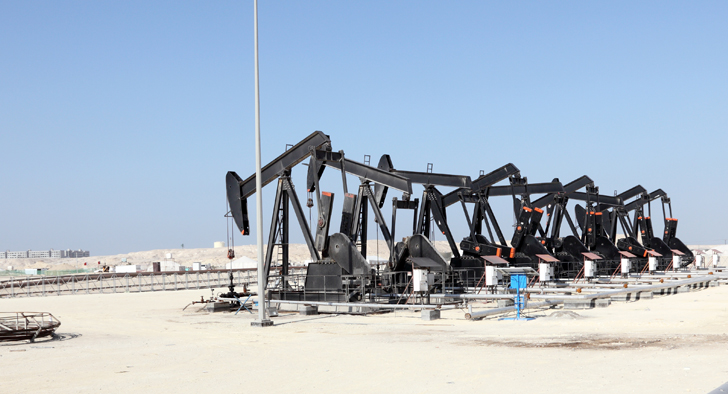Production Sharing Agreements (PSAs) in Egypt govern the relationship between the government and international oil companies (IOCs) for the exploration and field development of oil and gas. The agreements seek to strike a balance between Egypt maintaining sovereignty of its natural resources and the IOCs interests to maximize profit.
The PSA model is more than a game of give and take. Once the cards are laid on the table, the interests of 82 million Egyptians are at stake. Therefore, the flexible nature of PSAs are an indication of how the government and IOCs adapt to the country’s current political and socio-economic times and how they ultimately manage the oil and gas industry during tumultuous times.
Length of contracts
Time is money, and in the Egyptian oil and gas industry, that quintessential adage acquires an even more pressing tone. The oil and gas industry is a capital intensive, long-term investment for IOCs. “It´s a process that takes time and that has to mature,” said Maurizio Coratella, the General Manager of Edison Egypt, an Italian energy company. The development and production phase of oil blocks under PSAs is between 20 to 25 years, with the possibility of a five-year extension. The Egyptian government’s main concern is to maximize production to meet growing domestic energy demand and continue to repay its debt owed to IOCs. The government’s appeal for increased production adds pressure for IOCs to develop a field faster. However, the contract’s length may not always act as an incentive to produce faster, nor do the agreements´ legal implications.
The exploration phase of a new concession is typically two and a half years, with extensions of up to five years. Once an IOC makes a commercial discovery, they must notify the government of the discovery within a period of time; 1-12 months for oil, and up to 24 months for gas. In case of a commercial discovery of oil or gas, the IOC must submit a development lease application to the government within one year (or three years for offshore blocks), otherwise it must surrender the oil or gas reserves back to the state.
PSAs in Egypt are enacted into law, providing legal security for IOCs and sanctioning a level of transparency for the public. PSAs differ from traditional contracts in that the terms of the agreement cannot simply be changed by the parties involved. Instead, any changes necessary require the approval of parliament and the president. PSAs are inflexible in the sense that any amendments constitute a legal procedure that takes time. Nonetheless ratifying PSAs as laws adds a level of accountability to an otherwise private contract between two parties. Once it becomes a law, the PSA shifts responsibility from the government to the IOCs.
Exploration and production in Egypt (E&P) is past the era of easy hydrocarbons. Deep drilling is more expensive and requires more sophisticated technology. This is problematic when IOCs expect a speedy cost recovery process. In the past, foreign counterparts received “the so called ‘easy money’” before the government received anything, says Magdi Nasrallah, professor in the Department of Petroleum Engineering at the American University in Cairo. Once past the easy hydrocarbons stage, “the sharing process tends to be more complicated and not as profitable as expected,” Nasrallah said.
The problems of expediency that PSAs exhibit with their legal framework is made up for by the government’s willingness to extend the terms of a concession. Contract extensions of up to five years are not unusual in the oil industry. If more gas is discovered in an oil field during the 20-25 years allowed for the development lease, extensions of up to five years are permitted. However, the total period for the development lease does not exceed 30 years. This is limited by the Egyptian constitution and also applies for oil discovered in a gas concession.
“When you increase the length of the contract it means you are getting into the secondary recovery operations,” said Nasrallah. The secondary stage requires more effort and higher spending; “it requires more sophisticated technology to pump out the reserves which no longer come out under their own pressure,” he added. Once the contract ends, the field is usually depleted and the current IOC, or a new one, is invited to step in at the tertiary recovery stage and extract what is left.
To guarantee a sufficiently equitable hydrocarbon wealth share, “PSAs usually have a clause that restricts the expenses included by the foreign counterpart [IOCs],” explained Nasrallah. “In the past, this was left open-ended. Foreign counterparts would spend what they wanted on the field, “usually depleting the resources before the government got its share,” he said. Now, a regulatory authority has been set up to monitor spending. The budget and spending of IOCs are scrutinized throughout the E&P process. All the changes made to the budget must be approved by EGAS and EGPC. All expenses are documented periodically by the aforementioned entities.
Field development and oil recovery are costly operations that represent great financial risk to IOCs. However, the Egyptian government is energy hungry and exploring as many different alternatives as possible to satisfy demand. They are eager to encourage IOCs to boost oil and gas production.
The fact that PSAs are laws helps maintain the delicate balancing act between the government and IOCs. The stakes are high for both parties, as IOCs hefty investments are in limbo due to depressed Brent crude prices, even as Egypt struggles to accelerate gas production. PSAs attempt to be practical, flexible and lucrative for all involved. However, IOCs still aspire for greater leverage once they acquire a concession.
Egypt’s long history in the oil industry has established the legal infrastructure for PSAs to be a successful model. However, a game changer would consist of the government freeing some of the restrictions imposed on IOCs and fostering a regulatory authority that continues to secure the government’s best interests. Currently, EGPC and EGAS are active observants in the development of oil and gas fields. One idea recently put forward by the Minister of Petroleum is for the creation of a separate regulatory department within EGAS to assist with regulating natural gas concessions during their first six months.
The degree of government control and involvement in E&P is contested among IOCs and industry experts. The extensive length of PSAs renders the need for stabilization clauses to guarantee the protection of IOCs against adverse changes that could be made to the contract during that period. The clauses seek to reassure stakeholders that Egypt will meet and adhere to the fiscal commitments included in the original agreement. By taking these measures, the government does its best to ensure stability and predictability, especially when it pertains to a period of 20 to 25 years.
Under PSAs, the government still holds the power to terminate a contract or bring in another IOC if their partner does not meet the necessary terms. To absolutely ensure the development of fields, the PSA allows IOCs a grace period to begin production from the point of discovery. If production fails to take place, IOCs must surrender the fields. The concessions are subjected to periodical revisions every three years to guarantee the development of blocks.
“We really enjoy mutual trust with the authorities, which is extremely important, said Coratella. “We always see authorities delivering what they were promising or anticipating.” “At the moment, the government is more receptive to provide IOCs with enough room to work,” he continued. It is in the government’s best interest not to have IOCs with their hands tied behind their backs.
Egypt possesses great potential for oil and gas because it stands on a prime location, surrounded by industry intensive neighbors. The government is aware of the urgent need to boost economic growth and guarantee Egyptians sufficient energy to meet their demand. IOCs are also willing to invest in Egypt and eager to uncap the potential of the rich East Mediterranean, the Nile Delta and the Western Desert.
PSAs are not the biggest obstacle to E&P in Egypt. Larger challenges such as low international oil prices, a lack of foreign currency, devaluation of the Egyptian pound, and political stability after years of turmoil are all bigger issues. However, improvement in the PSA system would foster an environment of investment. It is the government’s responsibility to create a safe environment for investment and aspire to present IOCs with a scheme that takes into consideration oil prices, viability of projects, profitability, and most importantly, the best interests of Egypt.








